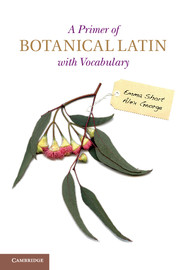Book contents
- Frontmatter
- Contents
- Preface
- Acknowledgements
- Introduction
- Part I Grammar
- 1 The noun
- 2 The adjective and the participle
- 3 The adverb
- 4 The preposition
- 5 The conjunction
- 6 The pronoun
- 7 The verb
- 8 Numerals, measurements (Stearn pp. 107–117)
- 9 Prefixes and suffixes
- 10 Miscellany
- Part II Exercises in translation
- Part III Translating
- Part IV Vocabulary
- References and further reading
- Index
9 - Prefixes and suffixes
Published online by Cambridge University Press: 05 April 2013
- Frontmatter
- Contents
- Preface
- Acknowledgements
- Introduction
- Part I Grammar
- 1 The noun
- 2 The adjective and the participle
- 3 The adverb
- 4 The preposition
- 5 The conjunction
- 6 The pronoun
- 7 The verb
- 8 Numerals, measurements (Stearn pp. 107–117)
- 9 Prefixes and suffixes
- 10 Miscellany
- Part II Exercises in translation
- Part III Translating
- Part IV Vocabulary
- References and further reading
- Index
Summary
A prefix or suffix is a part of a word that often cannot stand on its own, but which alters the meaning of the noun or adjective to which it is added. A prefix is attached to the front of the stem, and the suffix to the end. An example in English is the suffix ‘-ly’ which, when added to the adjective ‘quick’, converts it into the adverb ‘quickly’; another suffix is ‘-ment’ which, when added to the verb ‘enjoy’, produces the noun ‘enjoyment’. ‘Dis-‘ is an example of a prefix and alters nouns and verbs, sometimes dramatically, e.g. disfigure, disinterest, dislike; another is ‘un-’ giving us words such as unhappy, uncluttered and unclean.
Botanical Latin, similarly, uses prefixes and suffixes, of both Latin and Greek origin, although a Greek prefix or suffix should be added only to a Greek stem, and a Latin prefix or suffix only to a Latin stem. Some prefixes can exist on their own and can be used separately, such as the prepositions circum, around (circumsessilis), super, above (superficies), and trans, across (transectio), whereas others, such as eu- (eucarpic) and re- (reflexus), cannot.
- Type
- Chapter
- Information
- A Primer of Botanical Latin with Vocabulary , pp. 57 - 58Publisher: Cambridge University PressPrint publication year: 2013



